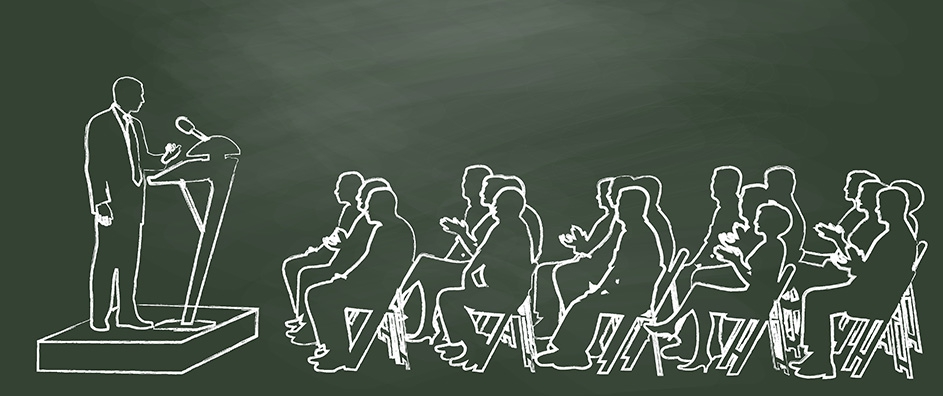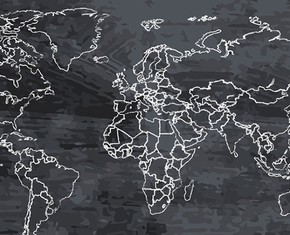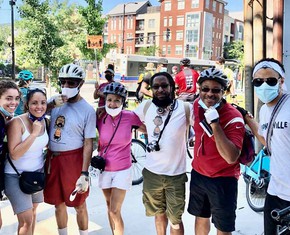The views expressed in our content reflect individual perspectives and do not represent the authoritative views of the Baha'i Faith.
This is man’s highest end, to others’ service, all his powers to bend. – Sophocles
Joy can be real only if people look on their life as a service, and have a definite object in life outside themselves and their personal happiness. – Leo Tolstoy
The high destiny of the individual is to serve rather than to rule. – Albert Einstein
In my first career, my professional life took me into the legislatures of California and several other states, then into Congress and the White House in Washington, DC. I learned quite a bit there.
First, I learned that many people who enter the field of public service do so in the true spirit of service. In their role as public servants, they really do want to help others. Not all elected or appointed leaders have a desire for power or wealth or fame—sure, some do, but I found that many honestly want to serve. We tend to hear a great deal of negative publicity about our leaders, and some of it is certainly justified—but not all of it.

Second, I gained a great deal of esteem for public servants, whether elected or appointed. Most of the ones I met and worked with, no matter what their party affiliation or political philosophy, tried hard, did their best and honestly wanted to make life better for their constituents. They labored away, putting in long hours for less pay than they could have earned in the private sector, out of a sense of duty and obligation to the people they represented. Yes, I also met some who had self-aggrandizing or self-enriching ulterior motives—but most honestly tried to truly serve others.
Third, I gradually came to understand that public servants have incredibly hard jobs. When you make decisions for thousands or even millions of people, when the most controversial and difficult-to-fix problems land on your desk after many competing opinions and groups couldn’t find solutions, as a leader you have to decide—and your decisions never please everyone. Public servants take an enormous amount of heat for the decisions they make, but those compromise decisions don’t come easy. If you’re a good leader, you have to learn the art of compromise, and that’s a tough skill to master.
Fourth, I learned that leadership requires vision. You have to think in long-term ways, and have a mission, a concept of the future, an ultimate end to work towards. Sometimes leaders fail at that goal, but most have a vision of the kind of society they’d eventually like to create. They do their best, in most cases, to find ways to realize that long-term vision. That’s not easy.
Fifth, and finally, I realized that society’s leaders deserve our respect. Personally, I must admit, I first went into the halls of Congress and the offices of elected leaders with less initial respect than I should have had. I made the mistake of believing everything I’d seen in the news, and of buying into some of the partisan rhetoric I had heard. Plus, I seriously underestimated the difficulty of the jobs my elected leaders had to do. After I saw, up close and in detail, what it took to do their jobs, I had to begin questioning my own prejudices, and in doing so I gained a great deal of respect for most of the people who work as public servants. Whether or not I agreed with their positions on the issues, I realized I owed them a debt of gratitude for devoting their lives to serving the public.
Yes, I know—those five things definitely don’t apply to every politician and leader. It’s certainly fashionable, and even expected, to put down politicians these days. We’re cynical about our governments; we think the system is broken; we suspect that money corrupts everyone; we don’t trust the powerful and the “elites;” we backbite and trash talk their efforts all the time. That’s completely understandable, because polls show that only a small percentage of the populations of most countries believe that their leaders have their best interests at heart. In many places, they don’t.
But these viewpoints and attitudes toward public servants, while they may be justified in some cases, can also form unwarranted prejudices toward every elected or appointed leader. When the corrupt actions of some politicians cause the condemnation of all public servants, those prejudices can become harmful, leading to incivility, disunity and distrust of everyone who wants to work for the public good. This widespread distrust then leads to generalized anger, rampant conspiracy theories, suspicion of all government and a sense of alienation among the governed.
Instead, the Baha’i teachings say, we should take a completely different approach to the way we think about and treat those who govern us:
O ye my loved ones! The world is wrapped in the thick darkness of open revolt and swept by a whirlwind of hate. It is the fires of malevolence that have cast up their flames to the clouds of heaven, it is a blood-drenched flood that rolleth across the plains and down the hills, and no one on the face of the earth can find any peace. Therefore must the friends of God engender that tenderness which cometh from Heaven, and bestow love in the spirit upon all humankind. With every soul must they deal according to the Divine counsellings and admonitions; to all must they show forth kindness and good faith; to all must they wish well. They must sacrifice themselves for their friends, and wish good fortune to their foes. They must comfort the ill-natured, and treat their oppressors with loving-kindness. They must be as refreshing water to the thirsty, and to the sick, a swift remedy, a healing balm to those in pain and a solace to every burdened heart. They must be a guiding light to those who have gone astray, a sure leader for the lost. They must be seeing eyes to the blind, hearing ears to the deaf, and to the dead eternal life, and to the despondent joy forever.
Let them willingly subject themselves to every just king, and to every generous ruler be good citizens. Let them obey the government and not meddle in political affairs, but devote themselves to the betterment of character and behaviour, and fix their gaze upon the Light of the world. – Abdu’l-Baha, Selections from the Writings of Abdu’l-Baha, pp. 318-319.
What does this mean? How can we obey our governments when we don’t trust them? Does this advice apply to corrupt politicians and governments? Do Baha’is completely divorce themselves from the political processes of their respective countries? In this short series of essays on those issues, we’ll look at the unique Baha’i approach to politics, and the revolutionary way the Baha’i teachings deal with the answers to those important questions.
Next: Politicians and the Divine Policy
You May Also Like
Comments

















Cet article m'a réconcilié d'abord avec moi même ensuite il ma permis de reconsidérer mon point de vue sur les politiciens.
Heck, as a NJ state employee for 39 years I only ran into a handful of slackers, and lazy ones with poor work ethics and habits. Of all the thousands of state employees I worked with and ...came in contact with during those years, every single one of them was simply trying to do the best they could, given, usually, circumscribed authority or resources.
That's why on my old Civic I was proud to display a bumber sticker praise NJ state employees.
I need this series, because I'm pretty
disgusted with the whole system. I
do believe the great majority of polit-
icians start out nobly, but many become polluted by the adversial
environment, and don't have the
character to avoid blame-shifting.
Those few who display real nobility
in the face of attacks stand out to the
point of being newsworthy, which it
shouldn't be. I really need to work
on this!
With loving greetings Zahra Cerrato
Ladjamaya